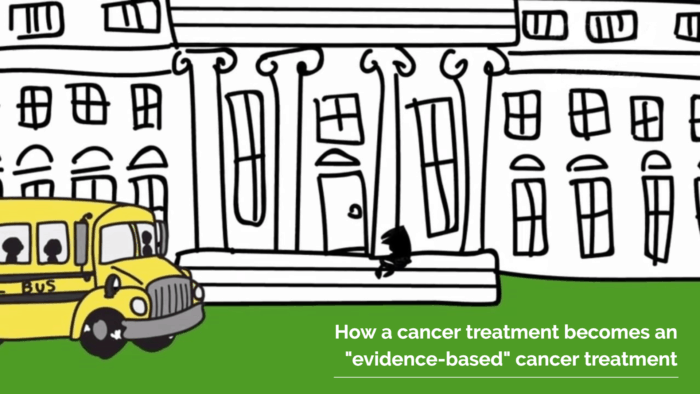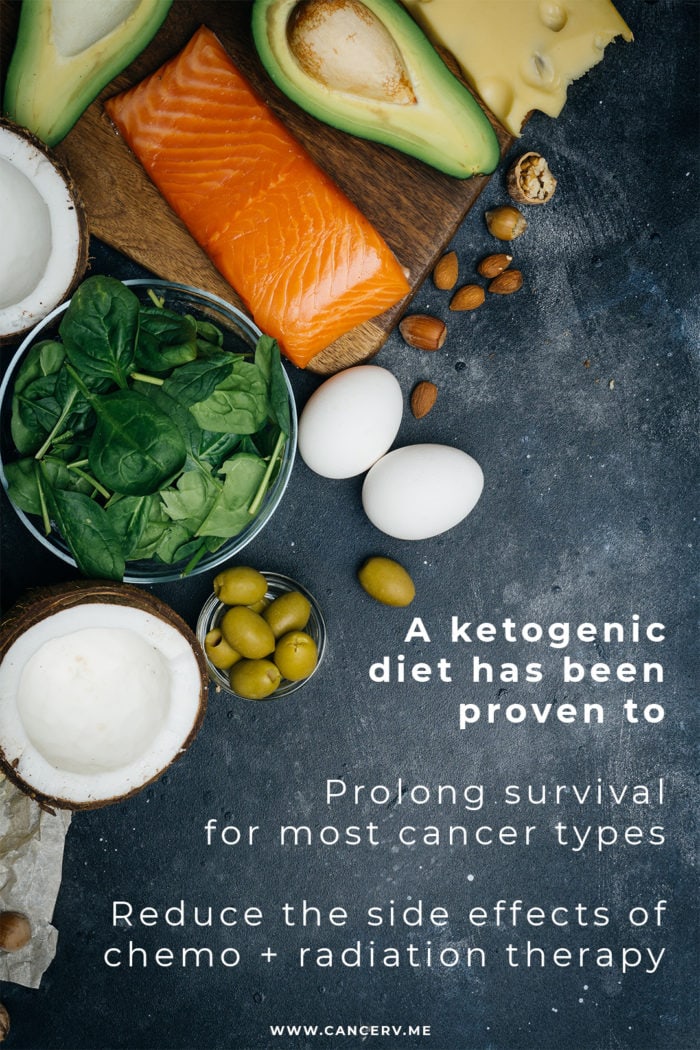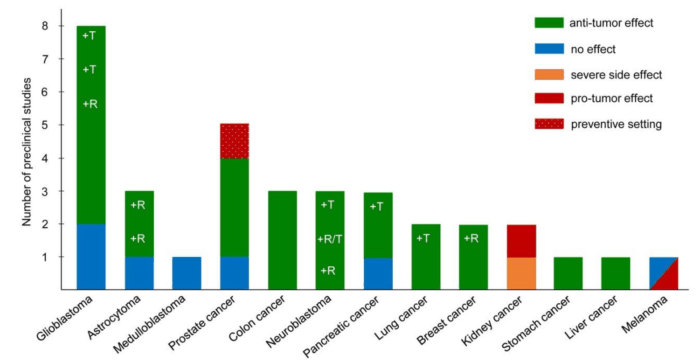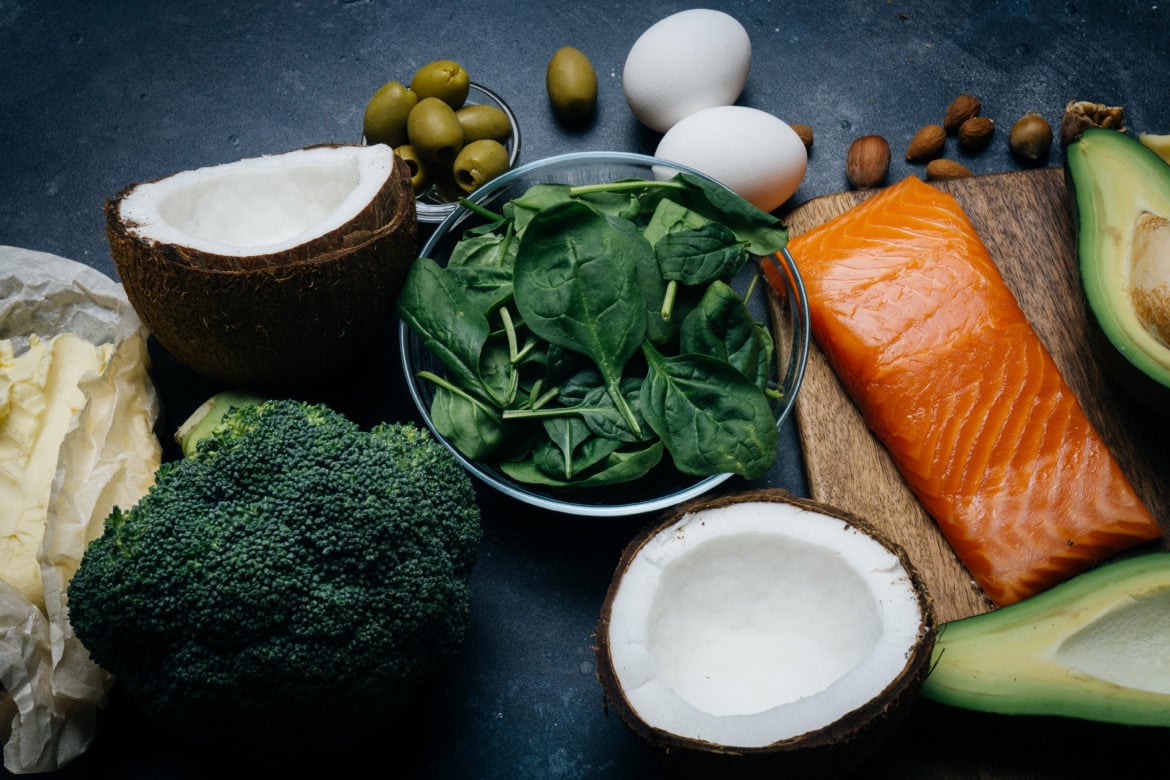I’ve been advocating for a ketogenic diet to fight cancer since about a week after I was diagnosed. I’ve been slowly dribbling out the reasons why I’m such a fangirl as I’ve come across experiment after experiment and anecdote after anecdote that demonstrate the benefits of this way of eating. I think it’s finally time that I compile all that evidence in a single place to illustrate why keto should be part of the standard of care for most cancers. (Fasting, too, but I’ve already covered that.) It is a fact that a ketogenic diet can shrink tumors and prolong survival when used alone and in combination with traditional therapy.
Before I begin laying out the evidence, a quick note about cancer research as I understand it and why you so often read about a study proving XYZ kills cancer cells and then stumble across seemingly conflicting information about how XYZ is not recommended because it’s not proven “safe and effective.”

First, there are in vitro studies. These are essentially experiments conducted in petri dishes and test tubes with cancer cells disconnected from body parts. They’re the least expensive and therefore the most common form of research. You want to test a hypothesis in vitro before shelling out the big bucks to test it in vivo, or in the context of an actual living body.
If your in vitro results impress, you write up a grant request to try and fund an in vivo experiment in mice. Mice have similar genetic behavior to humans but they’re still just an animal model so what works in mice may or may not work in humans. Still, ain’t nobody gonna let you test on a human unless your treatment cured the mouse and didn’t kill it.
Only after in vitro and mouse model success, and after so much grant writing or petitioning of whoever runs your company’s R&D budget, is it time for the actual human clinical trials overseen by the FDA. These are wildly expensive, as you can imagine, and designed within a framework of ethics that prevents withholding the prevailing standard of care. There may be some cases where individuals choose their own path and have the foresight to register their experience as a trial with the FDA in what’s known as a case study. These provide insight but it’s the larger controlled studies that carry weight. If you’re looking to have your treatment approved by the FDA, you’ll need to run a phase 1 clinical trial to determine a safe dosage, and a phase 2 to prove it’s effective at that dosage. When it gets that seal of approval from the FDA, it’s considered “safe and effective” and your favorite health and wellness website is allowed to recommend it.
With this context, I present you the evidence supporting keto as standard of care for cancer.

In vitro experiments showing benefits of keto for cancer
Dr. Thomas Seyfried has been running these tests out of his Boston University lab for over a decade and his 2015 paper published with Dom D’Agostino, Angela Poff and Roberto Flores pretty much sums up their work. https://www.ncbi.nlm.nih.gov/pmc/articles/PMC3941741/
Seyfried’s 2012 textbook Cancer as a Metabolic Disease and Travis Christofferson’s Tripping over the Truth (foreword by Dom D’Agostino), which relates the same findings through an incredibly readable narrative, helped initiate the metabolic paradigm shift and accelerate research.
 |
Cancer as a Metabolic Disease: On the Origin, Management, and Prevention of Cancer
by Thomas Seyfried, 2012 |
 |
Tripping over the Truth: How the Metabolic Theory of Cancer Is Overturning One of Medicine’s Most Entrenched Paradigms
by Travis Christofferson, 2019 |
Mouse model research showing benefits of keto for cancer
- 2014 Mice with metastatic brain tumors had their diets supplemented with ketones and had improved survival compared to a control group of mice. Ketone supplementation prolonged survival by 51% (diets supplemented with 1,3-butanediol , a precursor to β-hydroxybutyrate ketone), and 69% (diets supplemented with a ketone ester). Equally as exciting, “Ketone administration elicited anticancer effects in vitro and in vivo independent of glucose levels or calorie restriction.”
https://www.ncbi.nlm.nih.gov/pmc/articles/PMC4235292/ - 2017 Mice given pancreatic cancer and “treated with KD [ketogenic diet] and radiation had a slower tumor growth rate than mice treated with radiation alone.”
https://www.ncbi.nlm.nih.gov/pmc/articles/PMC5510645/ - 2018 Twenty of 25 mice were given colon cancer with 5 remaining as control. Half the mice with colon cancer were fed normal chow and the other half were fed a ketogenic diet. With no other treatment, tumors were significantly smaller in the keto mice and body composition better. The results show keto “can suppress colon tumor progression and systemic inflammatory responses, and improving body and muscle weights, which might help to prevent cancer cachexia.”
https://www.ncbi.nlm.nih.gov/pmc/articles/PMC5852782/
Note that another 2018 study showed that keto alone wasn’t enough to stop progression of established liver tumors. https://www.ncbi.nlm.nih.gov/pmc/articles/PMC6162796/
Human trials showing benefits of keto for cancer
- 2010 A 65-year-old woman with glioblastoma multiforme (an especially aggressive brain cancer) used fasting and keto in addition to standard treatment to achieve a complete remission. Her tumor recurred 10 weeks after she stopped keto.
https://www.ncbi.nlm.nih.gov/pubmed/20412570 - 2016 Six cancer patients with a variety of types and stages adopted a keto diet while receiving radiation. This was a poorly organized study and no results about impact on the cancer can be drawn but it’s worth noting that all patients experienced fat loss but no muscle loss/ cachexia. https://www.ncbi.nlm.nih.gov/pmc/articles/PMC4779584/
- 2017 A 29-year old woman with triple negative metastatic breast cancer (another extremely aggressive type of cancer) was treated with keto and hyperbaric oxygen therapy in addition to standard care and achieved complete remission.
https://www.ncbi.nlm.nih.gov/pmc/articles/PMC5589510/ - 2019 60 women with late-stage breast cancer who needed chemotherapy prior to surgery joined the trial. 30 followed a calorie-restricted, MCT-based keto diet for 12 weeks while receiving chemo; 30 ate their standard diet. Thirty months later, 100% of the chemo+keto group survived while only 60% of the chemo-only group survived. https://www.ncbi.nlm.nih.gov/pubmed/31496287/
Keto is safe and well-tolerated
Keto has been used for centuries to treat epileptics and for decades to juice body building bros.
The most common medical concern I hear is that keto causes weight loss and weight loss isn’t desirable in cancer patients. However, the studies above have shown that keto causes fat loss, not the muscle loss that defines cachexia, the muscle wasting that kills so many cancer patients. While higher body weights have been shown to correlate with increased survival even as they correlate with higher risk in what’s known as the obesity paradox, a closer look shows that higher body fat is not so good for survival. In other words, muscle good, fat bad, according to cancer epidemiologists. And therapeutic fat loss is keto’s specialty.
Finally, fears that a ketogenic diet means an overload of glutamine-rich meats with their artery-clogging cholesterol and a dearth of cancer-fighting greens are unfounded. Keto doesn’t necessarily mean carnivorous. As you all know, I’ve been happily “mostly vegan” keto for a year now with my only animal products being fish oil supplements on non-fasting days; wild-caught fatty fish or organic, pasture-raised egg once a week; and occasional organic, pasture-raised chicken stock during extended fasts. Five days a week my total dietary cholesterol is 35 mg from fish oil supplements. Mondays it’s 0 and Sunday I get a little more from my salmon or egg. From October 2018-June 2019 I was completely vegan outside my supplements and I only added egg or salmon after starting metformin in July 2019. In short, reducing carbs does not mean reducing nutrition.

Arguments against Keto for Cancer
Detractors have two primary arguments. First is that keto hasn’t been proven to help all forms of cancer and can, in fact, fuel some types.
It’s true that some cancers can use ketones as fuel. However, preclinical research (in vitro + mouse model) has shown evidence that keto has an anti-tumor effect for most cancers – all cancers but kidney, melanoma and cervical cancer so far.
Summary as of 2017: https://www.ncbi.nlm.nih.gov/pmc/articles/PMC5842847/
Additional relevant study in 2018: https://www.ncbi.nlm.nih.gov/pubmed/29414764/
Not every type of chemotherapy works for every type of cancer – hell, my lifesaving targeted therapies only work for about 70% of lung cancer patients with my exact mutation. It doesn’t mean it shouldn’t be part of the standard of care for the cases where it can prolong lives.

From: https://www.ncbi.nlm.nih.gov/core/lw/2.0/html/tileshop_pmc/tileshop_pmc_inline.html?title=Click%20on%20image%20to%20zoom&p=PMC3&id=5842847_aging-10-101382-g001.jpg In 2018, after this survey was complete, an additional in vitro study showed good results for pancreatic and poor results for cervical cancer cell lines. https://www.ncbi.nlm.nih.gov/pubmed/29414764
The second argument against keto is that it may not be effective indefinitely.
Cancers are your body’s own cells, of course, and may still have remnants of those cells’ metabolic adaptability. It’s possible that, deprived of glucose long enough, they can develop pathways to better utilize other types of fuel. Nevertheless, as someone who once had only 6-8 months I can only say that every additional month that keto affords me is precious and worthwhile. I always emphasize that no diet is a cure for cancer and I’ve never had that expectation. The fact that a diet can extend my life while reducing symptoms of treatment, however, is a miracle itself. For others, that extra time may be all that’s needed for conventional treatments to do their job.
Keto for Cancer Resources
This really is just an overview of the benefits of this way of eating for most cancers. If you’d like to learn more or are interested in implementing this diet for your own therapeutic benefits, I highly recommend some further reading:
Keto for Cancer is a great explainer on how to implement a therapeutic ketogenic diet. Miriam Kalamian is a nutritional consultant who extended the life of her son far beyond his expected survival through a ketogenic diet. Seyfried himself provides the foreword. The Metabolic Approach to Cancer by Dr. Nasha Winters is an excellent compliment.
 |
Keto for Cancer: Ketogenic Metabolic Therapy as a Targeted Nutritional Strategy
by Miriam Kalamian, 2017 |
 |
The Metabolic Approach to Cancer: Integrating Deep Nutrition, the Ketogenic Diet, and Nontoxic Bio-Individualized Therapies
by Dr. Nasha Winters and Jess Higgins Kelley, 2017 |
I want to add the usual disclaimer about consulting with your doctor before starting any new diet. Do that, but keep in mind you may need to educate your doctor. From personal experience, when I told my oncologists that I was a true believer in the metabolic theory and followed a plant-based keto diet, they had no idea what I was talking about. You’ll notice that almost all the books and research above were published in the last few years. We are riding the crest of this paradigm shift.
What do you think?
Is there research that I’m missing? Other compelling points in favor or against using keto in cancer treatment?
Let me know if the comments!



12 comments
I did not realize there were human trials for keto and breast cancer! That is so encouraging! Coupled with fasting, I feel much more in control of the threat of recurrence. ❤️
Yes! And I just got back from the Metabolic Health Summit last month where I learned of several more in progress or awaiting publication. One currently awaiting publication relates a woman with stage 3 cancer who is now no evidence of disease after water fasting 1 week every 1-2 months. She never had conventional treatment. This is all so new and we are on the front wave but there is about to be a tidal wave of new therapies for cancer! We are totally in control!
Thank you for sharing, did someone help you with your diet or did you see it from the books you share
Hi Gema! I developed my diet from the books I read and many more published studies – including the ones cited above. This January/ February I was lucky enough to attend the Metabolic Health Summit and have access to some pre-publication research.
I did consult a nutritionist at one point when I was experiencing some unusual GKI numbers. I later was able to trace it to gastroparesis which I intend to talk more about in another post =D I would say definitely consult a nutritionist if you have any questions or concerns. I found mine through the Charlie Foundation and she is wonderful – feel free to email me if you’d like her info.
Hi Maggie! I am really enjoying perusing through your site as all of your research corresponds with my own from the past four years. I am almost 2 years post cancer treatment for HER2 positive breast cancer. I am curious about your diet and would like to know if you use any cookbooks? I like your recipes, however I do not do so well with raw. I have been eating a ketogenic diet for the last 14 months, and I have been fasting as well. I am not a vegan and feel really torn about giving up meat. I’ve done that in the past, but even my vegetarian oncologist told me to start eating meat… Maybe I just don’t assimilate enough protein from vegan sources. Anyhow, I am looking for recipes That are more in line with the way that you eat. I have some fasting questions as well, but I’ll ask those on the right page!
Haha! Anita, you are wonderful! Thank you for making me smile first thing in the morning. I’m so sorry for what you went through but am amazed that treatment is behind you and have no doubt it will stay that way with all that you’re doing for your body.
I’m so sorry to say that I don’t use a ton of cookbooks. I will definitely start to include more cooked food recipes here. Two of my favorite cancer books, “Keto for Cancer” by Miriam Kalamian and “The Metabolic Approach to Cancer” by Dr. Nasha Winters and Jess Higgins Kelly include recipes. (I’ve been lucky to meet Miriam, Dr. Nasha, and Jess in person and am overwhelmed by their knowledge and experience). The lovely “How Not to Die” by Dr. Gregor also has great recipes (and a complete indoctrination into plant-based eating) and my friend Liz McDowell literally wrote the cookbook on “Vegan Keto.” She has a blog and ebook eating plan at meatfreeketo.com if you don’t want to make the full investment in the cookbook yet. Finally, though I haven’t read it myself, the Pegan Diet Cookbook by Madison Miller looks right up my ally.
I hope this helps! Look out for more cooked food here, too =D
Hi Maggie, You are doing such wonderful work sharing all that you’ve learned, living fully with vitality and giving hope to so many. I was excited to implement all of that until I read that this eating lifestyle is not successful for those with melanoma. Do you have any advice or know any direction I can turn to find out what I should do with my diet for melanoma? Thank you and wishing you all the best! Suzan
Hi Suzan, I’m so sorry to hear about your melanoma. The research for keto is still so new and it was only one preclinical study that showed poor outcomes. Even so, until there’s more evidence that ketosis is safe for you, a whole food, plant-based diet is what I would do. It will allow you to take advantage of all the plant medicine I talk about and cut out all the cancer-feeding sugar but without the metabolic adaption to keto. And of course, stress reduction is vital and clinical metabolic therapies may still help. Sending love!
Yeah, you’re missing that “cholesterol” has not been a viable health or dietary concern (despite all the food labels touting low cholesterol) for a very long time and relatively recently a well-recognized source which I can’t recall presently but something on the level of the AMA or the FDA specifically finally stated that cholesterol is not something of concern. As long ago as about 2000 the Weston Price Foundation produced the part cook book part nutritional atlas/masters thesis called Nourishing Traditions co-written by Sally Fallon and, most importantly, a bio-chemist in her 80s, Mary Enid (IIRC) who had been studying the impact of saturated fats from healthy sources for decades and had for decades been saying that cholesterol is not the problem w/fats; it’s the overheating which produces hydrogenated fats or oils that has been contributing to our soaring heart disease rates and all the high carb, no fat diets and foods on them (most of which were highly processed and had added sugars to make them more palatable once the fats were removed) that were killing us; not saturated fats which we absolutely need. So your research re: cholesterol is way, way behind the times. And if you are sloppy there in the basics where else have you been sloppy — no way to know.
Indeed! There’s a great documentary outlining this on Netflix called Fat Fiction that I highly recommend to all interested. Nevertheless, because the valid research hasn’t been widely accepted, there is still concern in the US about cholesterol. Wherever one stands regarding cholesterol, it shouldn’t be a concern preventing adoption of a ketogenic diet for cancer.
You are so right not to trust my or anyone else’s opinion or interpretation of data. I’ve linked to the original research on the National Institutes of Health government website in every place to make it easier for those who need it to develop their own informed opinion.
(Disclosure: since leaving this reply, the co-EP of Fat Fiction has signed on as co-EP of my documentary https://cancerevolution-movie.com/)
Hi Maggie,
I can’t tell you what a great ray of hope, your clearly written, informative article and has given me! My beautiful daughter-in-law has just been diagnosed with stage II-III colon cancer. She is just 36 yrs old! She and my son have been married for less than 3 years and they have an 18 mth old son. They also want more children.
After much research and consultations, she/they have decided to go for holistic, alternative treatment, even eschewing an operation. The location of her tumour indicates a colostomy and stoma, and understandably, this would have difficult repercussions in her private life. She already underwent extensive surgery after the birth of their son, having had a grade 3 tear, both externally and internally.
She has begun on a very strict vegan keto diet, given her by a ‘healer- rabbi’. It frightened the life out of me! I couldn’t understand how anyone could survive on such a diet. She is very fine-boned and thin, to start with, so I can’t imagine how she will look, after following this diet for some time!
The couple hope to start fertility treatment as soon as possible, extracting eggs and freezing embryos, for surrogacy.
Since they told us last week, I have been depressed, worried and full of misgivings about the efficacy and/or safety of this diet. I have scoured the Internet for information about (this specific) cancer, its treatments, research and personal stories. There’s such a lot, and I can’t say I’ve read or understood everything, but I can say that you have restored my hope!
I pray for your health, as well as that of many others, and of course, for the full health and recovery of my daughter-in-law!
Hi Esther! Thank you so much for the kind words and yes! there is so much hope!! I spent 2021 touring the US and meeting with most of the leading scientists researching the benefits of keto for cancer for an upcoming documentary – https://cancerevolution-movie.com/. I attend conferences dedicated to metabolic cancer science. This is real!
Most of the scientists and physicians I’ve spoken to emphasize the benefits of metabolic therapies COMBINED with conventional treatment. That being said, I have a few friends who were not able to use standard of care due to being diagnosed too late who have found incredible healing with just fasting and keto – if you haven’t already, please listen to my friend Sarona’s study: https://cancerv.me/2022/03/21/nothing-to-lose-everything-to-lose-sarona-rameka-beat-stage-4-terminal-cancer-with-just-keto-fasting/ Her case has been published in the respected, peer-reviewed journal Frontiers in Oncology. Hers is one of over 50 I’ve collected to date.
Note that your daughter-in-law will lose weight but research has shown that the weight lost from keto IS NOT cachexia and in fact keto can prevent and possibly prevent cachexia. I became very skinny during my year with cancer but never underweight. Now that I’m on a slightly less-strict whole-foods, plant-based but still mostly ketogenic diet, I’m leveled off in the top half of the normal range. Even if I had become underweight like Sarona, it would have been a small price to pay to not die =D
Thank you again for taking the time to comment. I’m sending you and your family all my love and thoughts of healing. May you all be able to enjoy your beautiful grandson during this difficult time while preparing for many more!